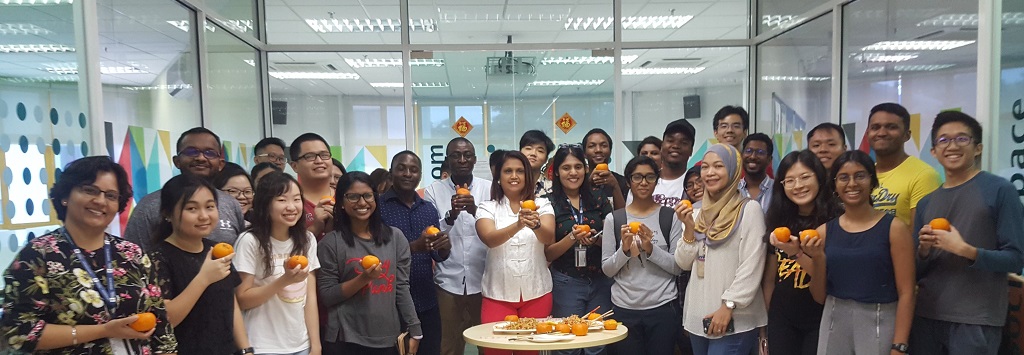
January 20, 2020, by Lisa Chin
A postgraduate toss to a prosperous new year
Ready to ring in the Year of the Rat?
It seems like it for our postgraduates as we hosted them to an early Chinese New Year luncheon on Wednesday 15 January 2020.
Chinese New Year comes a little too early this year so it feels like huh, we just celebrated Christmas and New Year, like a few weeks ago! Soon after we packed away the winterish Christmas decorations, we swiftly put up the brilliant red lanterns and blooming plum blossoms.
Also known as the Lunar New Year or simply, Spring Festival, Chinese New Year falls on 25 & 26 January 2020 and we just have less than a week left to go!
Yee Sang is a must!

A Chinese New Year special, Yee Sang, Yu Sheng or Prosperity Toss – however you choose to call it, took centre stage at the celebratory luncheon.
As always, we prepared Yee Sang for our postgraduates to lou sang/lo hei (prosperity toss) as a traditional way to bring good luck and fortune in the coming year.
The dish, which is essentially a salad, symbolises good luck, prosperity, happiness and auspiciousness in general.
The postgraduates gathered around the table and cheered as they tossed the dish. They were joined by Deepa Kumari Veerasingam, Head of Graduate School. Before the toss, Deepa welcomed and thanked the postgraduates for their presence at the celebratory luncheon. The postgraduates were then treated with an array of local Chinese dishes.
Did you know?
Yee Sang was declared a Malaysian heritage food by the Malaysian Department of National Heritage. Historians say it was created at a restaurant in Seremban in the 1940s, which served the salad during Chinese New Year celebrations.
Say what?
For our international postgraduates, if you do not know any Chinese New Year greeting, here are some basic ones for you to learn, in time for you to use them during this Chinese New Year!
In Mandarin, they say gong xi fa cai (恭喜发财), wishing you a prosperous New Year. In Cantonese, it is gong hey fat choi. Still, if you wish someone xin nian kuai le (新年快乐), literally Happy New Year, that is perfectly fine, too.
So here, we would like to wish all 新年快乐, 恭喜发财!
Tell us the most frequent question you’ve get from your relatives during Chinese New Year
There are so many delightful aspects to Chinese New Year whether you are celebrating or not. Last year, we asked about your favourite Chinese New Year moment.
Differently this year, we would like to find out what is the most frequent inquisition you would get from your relatives during Chinese New Year.
There is no better time to catch up with your relatives and friends besides Chinese New Year. While the festivities can be fun, it can also be somewhat stressful. It is when elders act upon their heavenly mandate to ask you the most personal and uncomfortable questions.
These questions are always asked in a very typical local style, with our very own rojak (mixed) language, the Malaysian pidgin.
“Still single ah?”, “When you want to kahwin (getting married)?”, “When you want to have baby?”, “Why so fat lah?!”, “Why so kurus (skinny)?”, “How much you earn ah?”, “Old liao still study ah?”, etc.
So let us know what is the question that you would get the most during Chinese New Year, please email it to graduateschool.nottingham.edu.my. We would like to feature it on our postgraduate blog and social media platform.
No doubt, some of the questions that your inquisitive aunties and uncles are bound to ask during the festivities can make you feel unpleasant. While you may be tempted to hit back with a witty counter remark (or avoid them altogether), it helps to put things into perspective and realise that your relatives probably do not mean any ill will. Most of the time, they care, and that is why they asked. So simply remember that your relatives mean well and handle every inquiry as you would the crisp on your pineapple tarts – lightly and sweetly.
-
Post a comment
